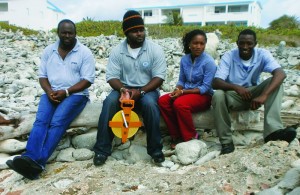
L-R: Carlos Sasso, Randall Richardson, Kafi Gumbs, Remone Johnson.
Ms Kafi Gumbs, the recently-appointed Director of Fisheries and Marine Resources, says the fishing industry in Anguilla has a lot of potential and one of the responsibilities of her department is to develop that potential.
She was at the time speaking to The Anguillian particularly with respect to the 200 nautical miles of territorial waters to the north of Anguilla where some of the island’s main fishing grounds are located. She noted, however, that because of their culture and lack of resources, Anguillian fishermen go to fish in the morning and return in the evening unlike fishermen elsewhere.
“In contrast, in other Caribbean islands, fishermen spend days and weeks at sea. This is because they have fishing trawlers, processing plants and export markets,” she said. “One of the things that I wish and dream and would work on – because that is one of my hopes for the island – is to develop the fishing industry where we can have value-added products.
“It means that fishermen would not only catch fish and sell them under the tree at the market, or to the hotels, but would have a fish-processing plant whereby fish products are canned and exported with Anguilla’s name on the cans. We can also look at curing and salting fish – and the whole idea of packaging and exporting products rather than simply putting fish on ice and sending them to St Martin. But we could send processed fish to St Thomas, Canada, the United Kingdom and so forth. We are a British Overseas Territory and we can build on that relationship through what we have to offer – more than sun, sea and sand. When we think about sun, sea and sand, we are thinking about tourists sitting on the beach and may be snorkelling.
“The sea is one of our biggest resources and we can look at farming certain species of fish for export to countries where people eat a lot of exotic creatures. I know of somebody, for example, who inquired about looking into the marketing of sea cucumbers aka ‘donkey dung’ of the scientific class Holothuroidea.”
Ms Gumbs was of the view that offshore fishing would provide an opportunity for fish stocks in the near-shore reefs to naturally replenish. She observed that many people in Anguilla preferred the full size of the smaller near-shore fish on their plates rather than the sliced up tuna or mahi-mahi. She noted that with this in mind it might be necessary “to work at changing people’s perceptions and culture to get them to eat more of the offshore pelagic fish in order to give the near-shore fish a break.”
Ms Gumbs and her team intend to begin the New Year by strengthening the relationship between the department and the local fishermen, recognising that without them nothing much can be achieved, and that they are an essential part of the team.
She added that the independent field work conducted by the department and the information shared by fishers are the only ways that the department will progress with its plan for developing the fishing industry in Anguilla.







